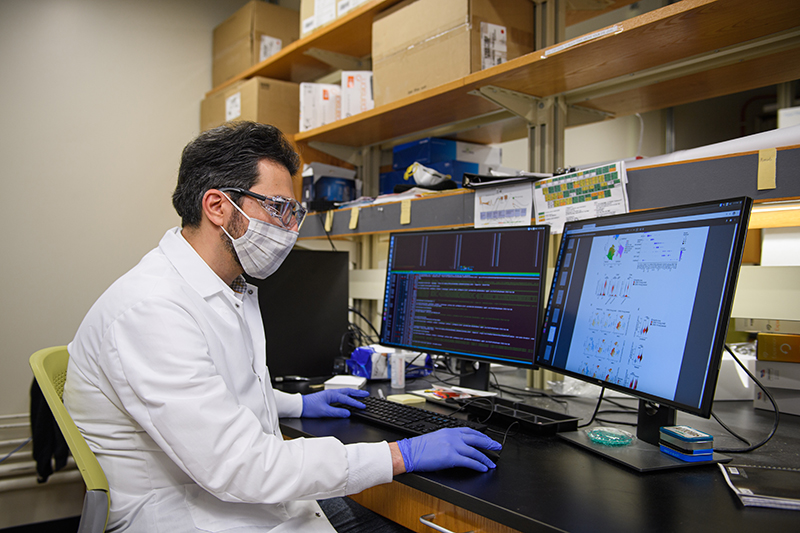September 7, 2021
A gene that controls the severity of colon cancer

Majid Kazemian and a team of scientists have discovered that the gene TCF-1 plays a key role in controlling TReg cells, affecting the severity of colon cancer. (Purdue University photo/Rebecca McElhoe.)
Key research finding
Regulatory T cells (TReg) are essential to regulating the immune system. However, there are several different types of TReg cells, and scientists are only now beginning to differentiate among them and understand their functions and roles. Researchers from Purdue University, including Majid Kazemian, an assistant professor of biochemistry and computer science, and a team of collaborators from Mayo Clinic and the University of Chicago discovered that the gene TCF-1 controls the functions of a specific set of TReg cells. Without TCF-1, these TReg cells keep their normal repressive function, but they gain additional properties and become inflammatory: They become more activated, increase the cancer signals, and gain a gut-homing feature, resulting in more drastic and dangerous colon cancers. Patients with colon cancer have these same TReg cells that lack TCF-1in their tumor. Before this research, scientists knew many of the main regulators, but this is the first time the link between TCF-1 and colon cancer has been explored. Future drug development could focus on this pathway to treat or ameliorate certain kinds of colon cancer.
“It’s extremely important to be able to manage the degree of immune response,” Kazemian said. “That’s why understanding these TReg cells is so important. If you have too much of a response, you get autoimmunity. If you have too little, you get cancer. Healthy systems need to strike a balance between autoimmune disease and cancer, and proper TReg cell function plays a key role in doing that.”
Purdue professor, title
Majid Kazemian is an assistant professor of computer science and an assistant professor of biochemistry. He is an expert in the genomics of immunology, cancer and infectious diseases.
Journal name
Nature Immunology. Paper is available online.
Funding
National Institute of General Medical Sciences of the National Institutes of Health (NIH) grant R35GM138283
Brief summary of methods
The scientists set out to study the link between TCF-1 and TReg cells. They discovered that when they removed TCF-1, the TReg cells changed their behavior, became gut-homing and more numerous. They studied TReg cell activity in mice that lacked the gene and compared the activity to TReg cells in human patients with colon cancer.
Writer and media contact: Brittany Steff, bsteff@purdue.edu
Source: Majid Kazemian, kazemian@purdue.edu
Note to journalists: Journalists visiting campus should follow visitor health guidelines.

